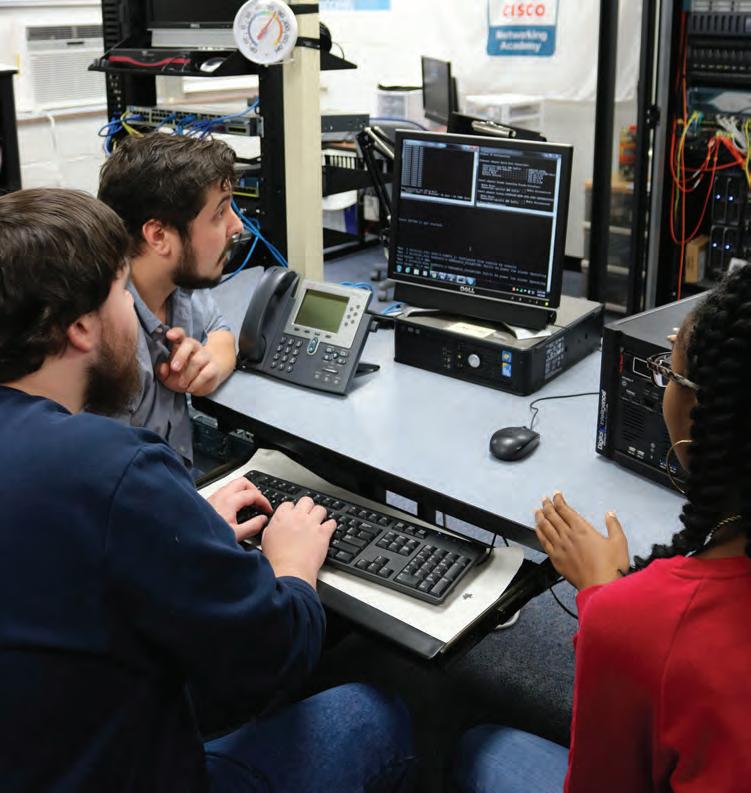
9 minute read
Criminal Justice & Public Safety
These programs prepare graduates to work in law enforcement, corrections, public safety, or in private security/investigations firms.
Administration of Justice – Law Enforcement Specialization (AAS) ................................................................ 124 Cybercrime Investigation (CERT) .................................................................................................................... 126 Foundations of Criminal Justice (CERT) ........................................................................................................ 127 Law Enforcement (CERT) ............................................................................................................................... 128
Advertisement
DCC’s Cybercrime Investigation program has been recognized by the Department of Homeland Security and National Security Agency. DCC was designated as a National Center of Academic Excellence in Cyber Defense Two-Year Education (CAE2Y) in 2016, the first rural community college in Virginia to achieve this honor!

Award: Associate of Applied Science
Plan Code: 400-01 CIP Code: 43.0103
PROGRAM INFO Minimum credits: 68 Length: 2 years (4 semesters), if suggested full-time course sequence is followed. Administration of Justice (ADJ) programs are designed to prepare individuals for careers in public safety. The A.A.S. degree does not substitute for attendance at a basic police Career opportunities: Realtime career outlook data is available on each program page academy required by Virginia’s local and state at danville.edu. law enforcement agencies. Students who plan to Division: Arts, Sciences, & Business transfer DCC courses into a four-year program in criminal justice/administration of justice are Contact: 434.797.8402 or 434.797.8462 strongly urged to consult with their faculty advisor and the counseling office for course selection. Transferability of ADJ coursework to four-year colleges or universities is contingent on the academic credit transfer policies of those institutions.
Admission Requirements: In addition to general college admission requirements, requirements for employment at criminal justice agencies may include: Excellent physical and mental health; Normal hearing and color vision. Eye functions must be normal (visual acuity must not be less than 20/40 in either eye without correction); Weight should be in proportion to height; Excellent moral character; No conviction of any crime involving moral turpitude or conviction of any felony; An excessive number of traffic citations would be cause to exclude an applicant from consideration by most agencies; U.S. citizenship.
NOTE: An extensive background investigation will be conducted by criminal justice agencies before hiring. Anyone who has been convicted of a felony or any offense involving moral turpitude or violence should consult with the faculty advisor.
Program Outcomes: Graduates will demonstrate knowledge of the following: 1. Various sources of crime data (e.g. FBI-based Uniform Crime Reporting system) and analytical skills necessary to evaluate strengths and weaknesses of crime data reporting; 2. Assessment skills applied to community-police programs and evaluative measures to be applied to the merits of police-sponsored community crime prevention efforts; 3. Functions of the different components of the criminal justice system—police, judiciary, corrections and protective services; 4. The role diversity plays in decision-making at all levels of the criminal justice system; 5. The global nature of crime, to include the impact of crime and the prosecution of criminal offenders operating in the U.S. and internationally to further a terrorist goal, commit cybercrime, or reap profits associated with criminal enterprises; 6. Stress reduction techniques, including a consistent physical fitness conditioning program; 7. The importance of volunteering one’s talents for the overall improvement of one’s community; 8. The need for uncompromising ethical and moral standards; 9. Exemplary written and oral communication skills; 10. Excellent information literacy skills.
Instructional delivery: All courses may be taken online although some may also be offered face-to-face.
College Credit for Academy Training: After an ADJ student completes 35 or more required credits, 21 and 15 credits respectively will be awarded as follows:
Virginia State Police Academy: 3 credits - ADJ 100, Survey of Criminal Justice, 3 credits - ADJ 130, Criminal Law, 3 credits - ADJ 236, Criminal Investigation, 9 credits - ADJ coursework*, 3 credits - Wellness Elective Total: 21 credits
Virginia Department of Criminal Justice Services Regional Academies: 3 credits - ADJ 100, Survey of Criminal Justice 3 credits - ADJ 130, Criminal Law, 3 credits - ADJ 236, Criminal Investigation, 3 credits - ADJ coursework* 3 credits - Wellness Elective, Total: 15 credits *e.g. ADJ 227 - Constitutional Law or ADJ 215 - Report Writing.
ADMINISTRATION OF JUSTICE – LAW ENFORCEMENT SPECIALIZATION Continued from previous page
Course Sequence FIRST SEMESTER SDV 100 College Success Skills ENG 111 English Composition I SOC 200 Principles of Sociology ADJ 100 Survey of Criminal Justice ADJ 130 Introduction to Criminal Law ADJ 145 Corrections and Community
SECOND SEMESTER NAS 105 Natural Science Topics for Modern Society OR Other Approved Lab OR Math Course ENG 112 College Composition II Approved Sophomore Sociology ADJ 131 Legal Evidence ADJ 227 Constitutional Law for Justice Personnel ADJ 236 Principles of Criminal Investigation Total
Total
THIRD SEMESTER PSY 200 Principles of Psychology ADJ 133 Ethics and the Criminal Justice Professional SPA 101 Beginning Spanish I SOC 235 Juvenile Delinquency ADJ 234 Terrorism and Counter-Terrorism
Total
FOURTH SEMESTER HUM 165/ CST 100 Controversial Issues OR Principles of Public Speaking1 Approved Computer Elective2 PSY 215 Abnormal Psychology SOC 236 Criminology ADJ 215 Report Writing PED/HLT Approved Wellness Elective
Total Lecture Lab Hours Credits Hours Hours in Class
1 0 1 1 3 0 3 3 3 0 3 3 3 0 3 3 3 0 3 3 3 0 3 3 16 0 16 16
3 0-3 3-6 3-4 3 0 3 3 3 0 3 3 3 0 3 3 3 0 3 3 3 0 3 3 18 0-3 18-21 18-19
3 0 3 3 3 0 3 3 4 0 4 4 3 0 3 3 3 0 3 3 16 0 16 16
3 0 3 3 3 0 3 3 3 0 3 3 3 0 3 3 3 0 3 3 3 0 3 3 18 0 18 18
1 Students may substitute CST 100 if required by the transfer school.
2 BUS 147 (Intro to Business Information Systems) is recommended for students intending to transfer.
G3Additional financial assistance might be available for G3 programs. Please contact your advisor or counselor for more information.

Award: Certificate
Plan Code: 409 CIP Code: 43.0406
This certificate is designed for current law enforcement and security employees to enhance their skills. Graduates of relevant law enforcement training programs may receive advanced standing credit for some requirements.
PROGRAM INFO Minimum credits: 38 Length: 4 semesters part-time Career opportunities: Realtime career outlook data is available on each program page at danville.edu. Program Outcomes: Graduates will demonstrate the ability Division: Arts, Sciences, & Business to: 1. Investigate computer crimes and incidents and Contact: 434.797.8402 or 434.797.8462 accurately analyze and report findings; 2. Prepare written computer forensics investigation reports that are admissible in court; 3. Describe network components, protocols, architectures, and the application of current communication and networking technologies; 4. Acquire, recover, document and analyze information contained within and created by computer systems, including different operating systems and networks, computer devices, and digital devices, including cellular telephones and digital cameras; 5. Identify the specifics of computer and network security exposures and vulnerabilities and the countermeasures available to prevent breaches and other system intrusions; 6. Help organizations increase awareness of security policies and procedures; 7. Collect, analyze and evaluate evidence data using industry-standard computer forensic software and hardware; 8. Collaborate with others to conduct a proper computer-forensics investigation; 9. Discuss and apply the rules of evidence and court procedures and apply the legal and ethical issues related to the acquisition and analysis of digital evidence. Lecture Lab Hours Credits Hours Hours in Class
Course Sequence FIRST SEMESTER SDV 100 College Success Skills ENG 111 College Composition I PSY 200 Principles of Psychology ADJ 100 Survey of Criminal Justice ITE 116 Survey of Computer Software Applications
SECOND SEMESTER ADJ 130 Introduction to Criminal Law SOC 200 Principles of Sociology ITN 276 Computer Forensics I
THIRD SEMESTER (SUMMER) ADJ 161 Introduction to Computer Crime ITN 277 Computer Forensics II
FOURTH SEMESTER ADJ 227 Constitutional Law SOC 236 Criminology ITN 260 Network Security Basics Total
Total
Total
Total 1 0 1 1 3 0 3 3 3 0 3 3 3 0 3 3 2 0 2 2 12 0 12 12
3 0 3 3 3 0 3 3 3 2 5 4 9 2 11 10
3 0 3 3 3 0 3 3 6 0 6 6
3 0 3 3 3 0 3 3 3 2 5 4 9 2 11 10
G3Additional financial assistance might be available for G3 programs. Please contact your advisor or counselor for more information.
Award: Career Studies Certificate
Plan Code: 221-400-45 CIP Code: 43.0103
Purpose: This Career Studies Certificate provides an overview of foundational topics related to criminal justice
Program Outcomes: Graduates will demonstrate knowledge of the following: 1. Functions of the different components of the criminal justice system—police, judiciary, corrections and protective services; 2. The need for uncompromising ethical and moral standards; 3. Exemplary written communication skills; 4. Excellent information literacy skills. PROGRAM INFO Minimum credits: 18 Length: 1-2 semesters Career opportunities: Realtime career outlook data is available on each program page at danville.edu. Division: Arts, Sciences, & Business Contact: 434.797.8402 or 434.797.8462
Lecture Lab Hours Credits Hours Hours in Class
Course Sequence ENG 111 College Composition I ADJ 130 Introduction to Criminal Law ADJ 100 Survey of Criminal Justice ADJ 133 Ethics and the Criminal Justice Professional SOC 236 Criminology ITE 115 Introduction to Computer Applications and Concepts Total 3 0 3 3 3 0 3 3 3 0 3 3 3 0 3 3 3 0 3 3 3 0 3 3 18 0 18 18
G3Additional financial assistance might be available for G3 programs. Please contact your advisor or counselor for more information.

Award: Certificate
Plan Code: 463 CIP Code: 43.0103
This certificate is designed to meet the short-
term training needs of existing law enforcement employees. Graduates of law enforcement training programs may receive advanced standing credit for some requirements. PROGRAM INFO Minimum credits: 34 Length: 2 semesters Career opportunities: Realtime career outlook data is available on each program page at danville.edu.
Program Outcomes: Graduates will demonstrate knowledge of the following: Division: Arts, Sciences, & Business 1. Various sources of crime data (e.g. FBI-based Contact: 434.797.8402 or 434.797.8462
Uniform Crime Reporting system) and analytical skills necessary to evaluate strengths and weaknesses of crime data reporting; 2. Functions of the different components of the criminal justice system—police, judiciary, corrections and protective services; 3. The need for uncompromising ethical and moral standards; 4. Exemplary written and oral communication skills; 5. Excellent information literacy skills.
Lecture Lab Hours Credits Hours Hours in Class
Course Sequence FIRST SEMESTER ENG 111 College Composition I ADJ 130 Introduction to Criminal Law ADJ 100 Survey of Criminal Justice SOC 200 Principles of Sociology PSY 200 Principles of Psychology SDV 100 College Success Skills
SECOND SEMESTER SOC 235 Juvenile Delinquency ADJ 215 Report Writing ADJ 227 Constitutional Law SOC 236 Criminology SOC215/268 Sociology of the Family OR Social Problems ADJ 133 Ethics and the Criminal Justice Professional Total 3 0 3 3 3 0 3 3 3 0 3 3 3 0 3 3 3 0 3 3 1 0 1 1 16 0 16 16
3 0 3 3 3 0 3 3 3 0 3 3 3 0 3 3 3 0 3 3 3 0 3 3
Total 18 0 18 18
G3Additional financial assistance might be available for G3 programs. Please contact your advisor or counselor for more information.

